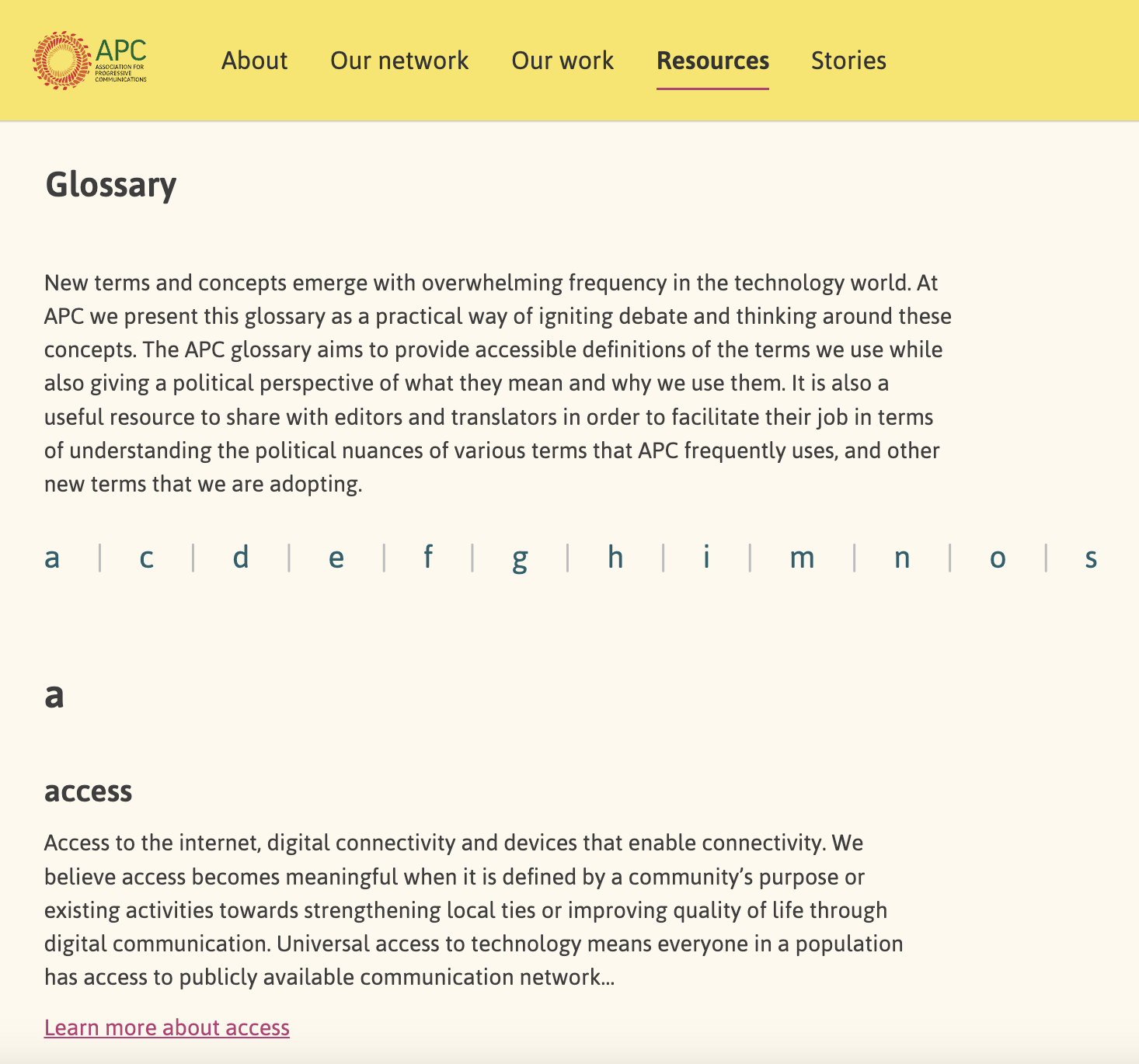
What is the difference between "access" and "accessibility"? What do we mean when we talk about "autonomous infrastructures"? Why is it important to understand terms like "digital divide" or "data extractivism"?
These questions are not just semantic exercises; they are crucial for anyone navigating the intersections of technology and social justice. The answers shape our understanding of the digital world and influence how issues of equity, inclusion or ownership are addressed.
Recognising the need for clarity in rapidly changing scenarios, the Association for Progressive Communications (APC) has developed a glossary that provides accessible definitions and political perspectives on key terms in internet and communications technology (ICT) and social justice. This glossary is designed to ignite debate, foster deeper thinking and ultimately contribute to a more equitable digital landscape.
APC glossary

Clarifying concepts for a just digital society
In the rapidly evolving field of ICT, new terms and concepts emerge at an overwhelming pace. This ever-changing landscape can leave many struggling to keep up, particularly those working at the intersections of technology and social justice. Here’s why this matters:
Precise language for effective advocacy. Without a clear understanding of terms, advocacy efforts can become blurry. For instance, conflating "access" (availability of technology) with "accessibility" (usability of technology for people with different levels of access, ability, etc.) can lead to policies that overlook the needs of marginalised groups.
Informed decision making. Policy makers, human rights defenders and the technical community need specific language to make informed decisions. Knowing the implications of “open source” and “free software” technologies, for instance, can impact choices about software adoption and development, with significant implications for community control and autonomy.
Inclusive discourses. Language shapes discourses. Terms like “digital divide” highlight the gaps in technology access between different communities, but understanding “digital inclusion” shifts the focus to bridging those gaps in meaningful ways. Understanding these perspectives is key for creating policies that are truly inclusive.
Accessible definitions and political perspectives on key terms in ICT and social justice
The APC glossary aims to provide accessible definitions of the terms we use while also giving a political perspective of what they mean and why we use them. It is also a useful resource to share with editors and translators in order to facilitate their jobs in terms of understanding the political nuances of various terms that APC frequently uses, and other new terms that we are adopting.
The glossary currently offers terms from the following areas:
Internet evolution. The glossary includes terminology related to the ever-changing internet, covering foundational concepts and emerging technologies. This helps users understand digital transformations and their broader societal implications.
Human rights online. It explores terms at the intersection of technology and human rights, highlighting ethical considerations and the potential of digital tools to promote social justice.
Social justice. With a focus on equitable access and inclusion, the glossary aligns with APC’s commitment to social justice, ensuring that digital resources are distributed fairly and all voices are heard.
Environmental concerns. In an era of climate crisis, the glossary includes terms related to sustainable practices and green technology, promoting more environmentally sustainable digital practices.
Feminist perspective. Addressing feminism and gender in the digital landscape is crucial. The glossary provides terms that help navigate issues like online harassment, diverse representation, and biases in algorithms and artificial intelligence (AI).
Understanding and using precise language in ICT is not just about keeping up with trends; it’s about shaping a future that is inclusive, equitable and just for everyone. The APC glossary aims to help reach this goal by allowing individuals and communities to engage with technology meaningfully, ensuring that they are not just passive consumers but active participants in shaping its future.
Join us in navigating the complexities of the digital age through a shared language that enables us to discuss and develop solutions at the intersections of technology and social justice. Explore, use, share this glossary.
Hashtags: #LanguageMatters #TechForSocialJustice